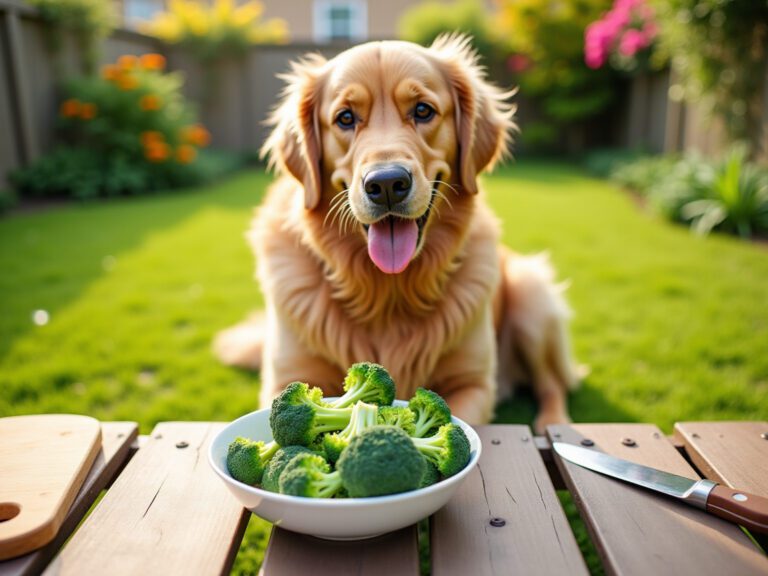Is Cottage Cheese Good for Dogs? Understanding Its Benefits and Risks
Overview
Cottage cheese can be a wonderful addition to your furry family members’ diet when offered in moderation. Packed with essential nutrients like protein, calcium, and probiotics, it supports their overall health and well-being. However, as a caring pet owner, it’s important to be mindful of potential digestive issues, especially for dogs that may be lactose intolerant.
Before introducing cottage cheese into your dog’s meals, we encourage you to consult with a veterinarian. This step ensures that it aligns perfectly with your dog’s unique dietary needs and health conditions. By taking this precaution, you can nurture a healthy and happy environment for your beloved pet.
Introduction
As devoted pet owners, many of us are always looking for ways to enhance our dogs’ diets with nutritious treats. Cottage cheese often comes to mind as a delightful option. This creamy dairy product is not only rich in protein and essential vitamins, but it also offers a variety of health benefits that can significantly support your dog’s overall well-being.
Yet, a crucial question arises: is cottage cheese truly a safe and suitable snack for our furry friends? By exploring the advantages and potential risks associated with this dairy delight, we can uncover important considerations that every caring dog owner should know before introducing it into their beloved companion’s diet.
Assess Safety: Is Cottage Cheese Safe for Dogs?
Many pet owners wonder, is cottage cheese good for dogs as a safe and enjoyable snack when offered in moderation? Many dogs find it easier to digest dairy products with lower lactose content, which raises the question, is cottage cheese good for dogs? However, it’s important to remember that some dogs may still experience digestive discomfort due to lactose intolerance, which can lead to gas, bloating, or diarrhea. To minimize these risks, consider gradually introducing curds into your dog’s diet, starting with small portions and closely monitoring for any adverse reactions.
Veterinary insights emphasize that while the question of is cottage cheese good for dogs arises, it should be plain and free from harmful additives like salt or flavorings. High sodium levels in cottage cheese can potentially lead to elevated blood pressure in canines. Excessive consumption may result in health issues, including weight gain and pancreatitis, especially in dogs with pre-existing conditions. Therefore, moderation is key, with curds comprising no more than 10% of your dog’s daily caloric intake. Before introducing new human foods into your dog’s diet, consulting a veterinarian is essential to ensure their safety. When approached thoughtfully, the question of is cottage cheese good for dogs can lead to it being a delightful snack that supports your dog’s overall wellness and vitality.
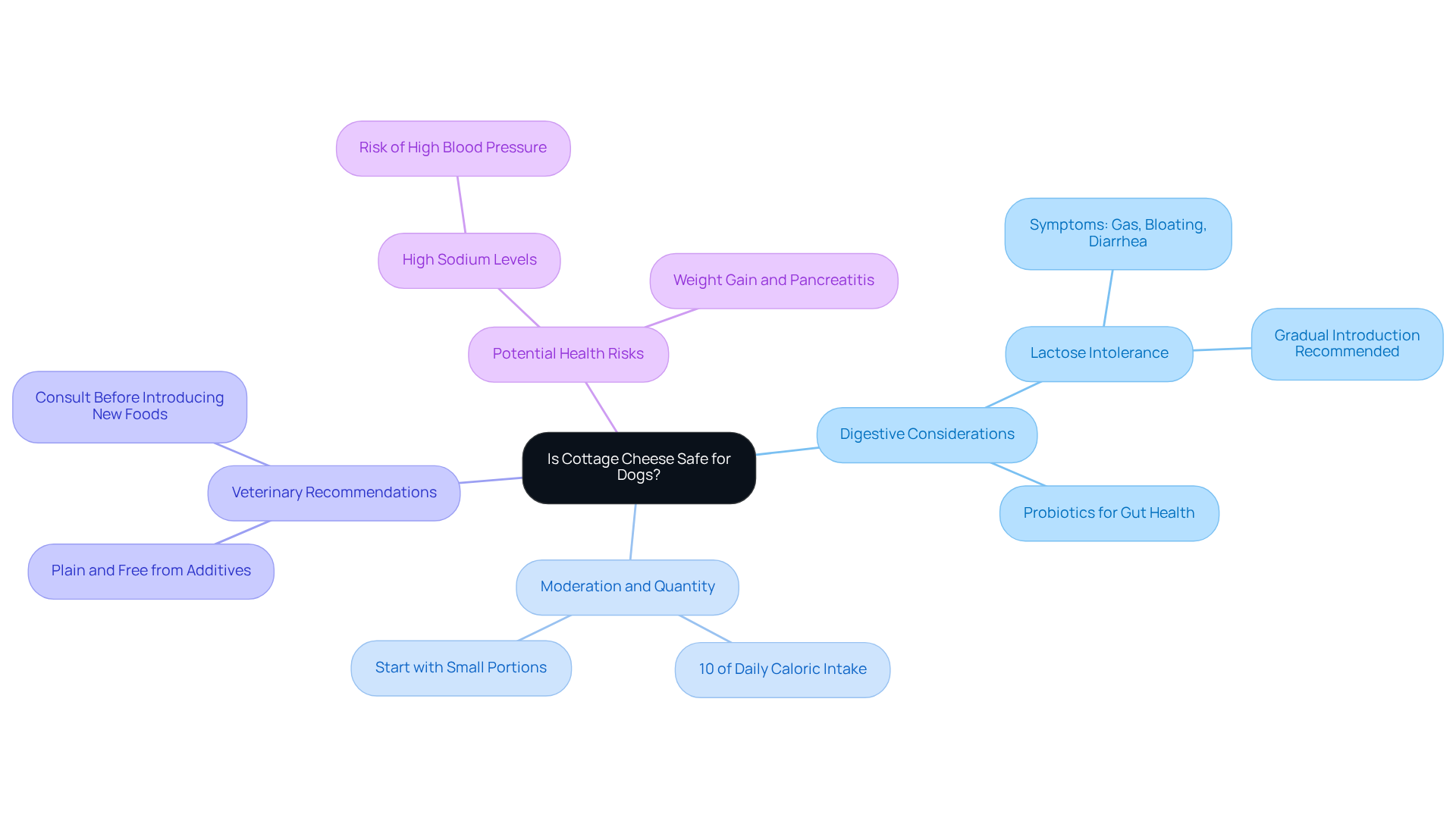
Explore Health Benefits: Nutritional Value of Cottage Cheese for Dogs
Cottage curds are a nutrient-rich food that prompts the question, is cottage cheese good for dogs, as it offers a variety of health advantages for your furry family members. They serve as an excellent source of protein, essential for muscle development and repair, making them particularly valuable for active dogs. In addition to protein, this dairy product is rich in calcium, crucial for maintaining strong bones and teeth. It also contains essential vitamins like B12, D, and E, which promote overall wellness and well-being.
The probiotics found in cottage curds contribute to gut health, enhancing digestion and fostering a balanced microbiome. With their low-fat content, they are an ideal choice for pets needing to manage their weight, allowing them to enjoy a delicious treat without excess calories. Furthermore, low-fat curds can be suitable for pets experiencing diarrhea as part of a bland diet.
However, it’s important to ensure that curds do not exceed 10% of your dog’s total food intake to maintain a balanced diet. When incorporating curds into your pet’s meals, it’s always a good idea to seek advice from a veterinarian to find out if cottage cheese is good for dogs, especially for animals that might be lactose intolerant. Additionally, cottage curds can be beneficial for hiding supplements that dogs may be reluctant to consume.
When presented in moderation, the question of whether is cottage cheese good for dogs can be answered positively, as it can be a wonderful enhancement to their diet, supplying a range of vital nutrients that support their overall well-being. So why not consider adding this tasty treat to your pet’s routine? Your furry friend deserves the best!
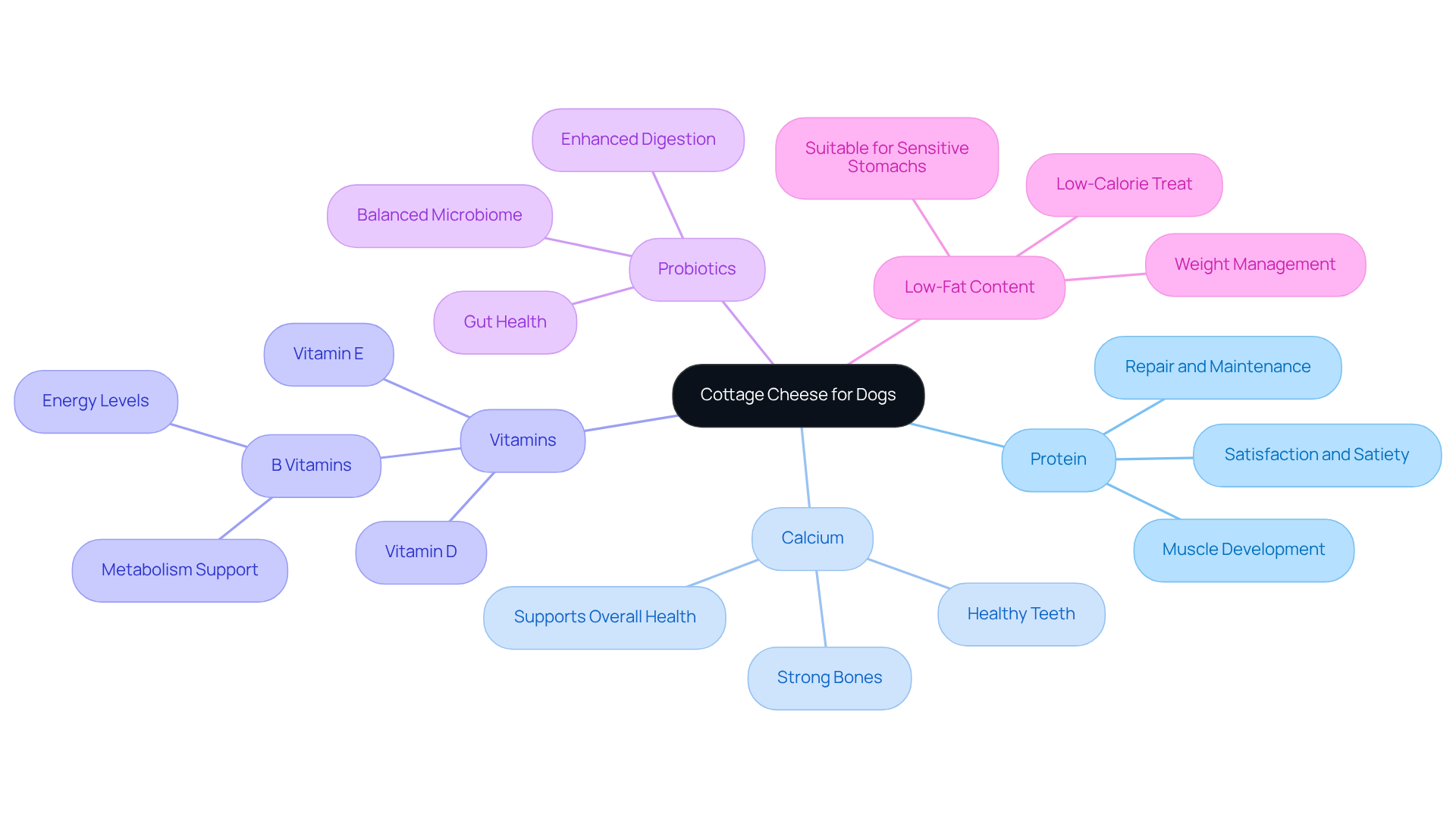
Guide Feeding Practices: How to Safely Introduce Cottage Cheese to Your Dog’s Diet
Introducing curds into your furry family member’s diet is a wonderful idea, especially if you are considering if cottage cheese is good for dogs, but it’s essential to do so gradually to ensure their digestive system can handle it. Start with a small amount, like a teaspoon mixed into their regular food, and keep an eye on your dog for any adverse reactions over the next few days. Watch for signs of lactose intolerance, such as diarrhea or gas. If everything goes smoothly, you can gently increase the portion size. A helpful guideline is to limit curds to about 10% of your dog’s daily caloric intake. For larger dogs, this might mean a few tablespoons, while smaller pups typically need just a teaspoon or two.
Always opt for plain, low-fat curds without added salt or flavorings to maintain their nutritional benefits. It’s crucial to consult with a veterinary professional before introducing dairy, especially if your dog has specific dietary needs or medical concerns, such as being on tetracycline antibiotics, since calcium can influence the absorption of certain medications. Remember, curds can be a delightful source of protein and calcium, supporting bone health and making for a nutritious snack, but one may wonder, is cottage cheese good for dogs? Your dog’s well-being is our priority, so let’s ensure they enjoy their new treat safely!
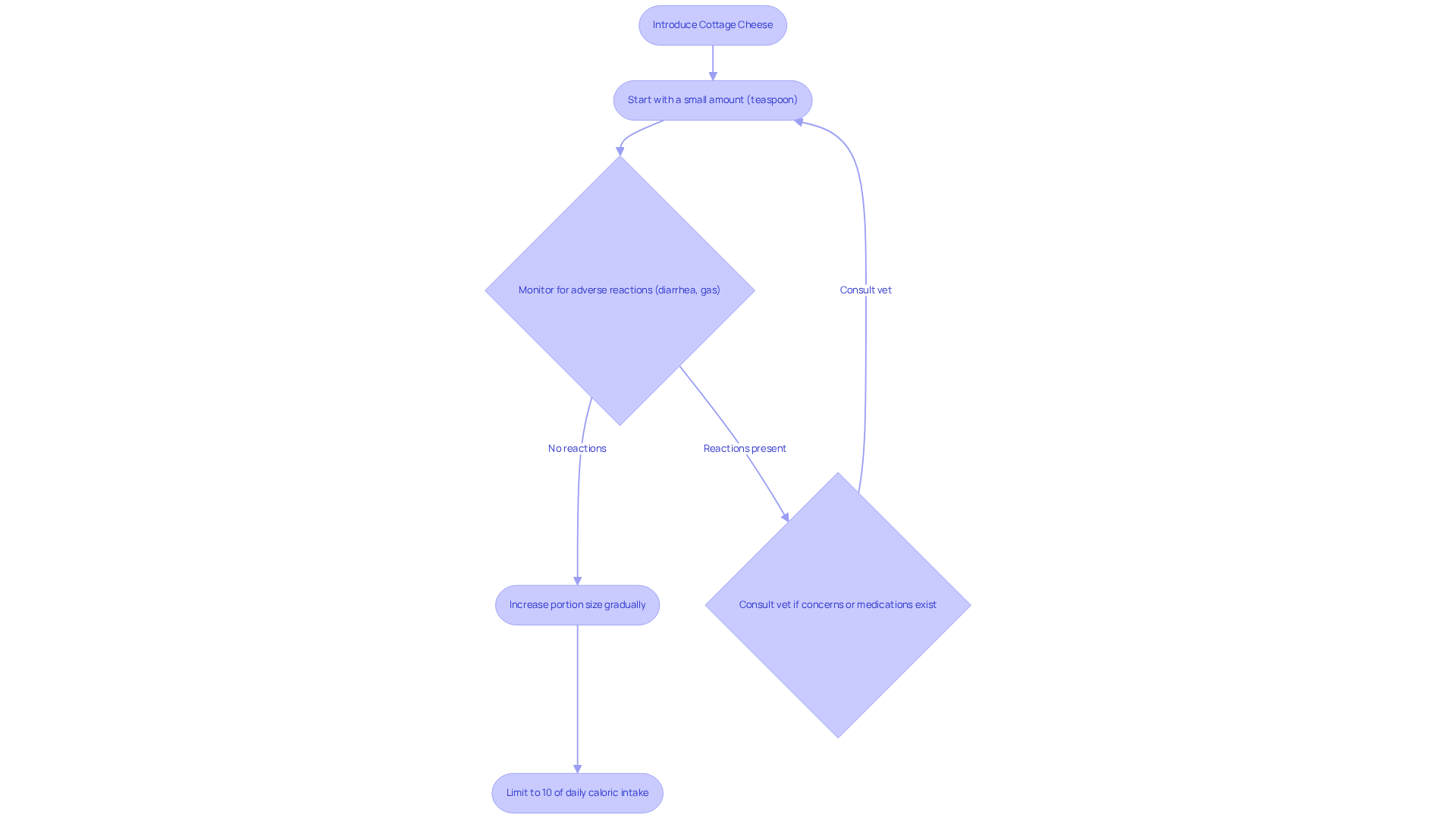
Identify Limitations: When to Avoid Cottage Cheese for Dogs
While cottage curds can be a healthy snack for your furry family members, it’s essential to consider when is cottage cheese good for dogs and when it should be avoided. If your dog is lactose intolerant or has a known dairy allergy, it’s best to steer clear of this dairy product. Consuming cottage curds can lead to gastrointestinal distress, including bloating, diarrhea, and abdominal pain. It’s worth noting that symptoms of lactose intolerance may not appear immediately; they can develop up to 48 hours after consumption. This makes it essential for you to observe your pet closely after introducing any dairy item into their diet.
Moreover, if your canine has been diagnosed with pancreatitis or is on a low-fat diet, high-fat dairy items like curds should be avoided. These products can exacerbate existing health conditions. Additionally, be cautious of the sodium levels in certain types of curds. Excessive salt consumption can lead to serious health issues, particularly in dogs with pre-existing conditions.
While there are risks associated with curds, they can be safe for dogs when offered in moderation. In fact, they can provide benefits such as probiotics that help dogs suffering from diarrhea and inflammatory bowel disease (IBD). Before introducing cottage cheese or any new food to your dog’s diet, it’s crucial to consult with a veterinarian to find out if is cottage cheese good for dogs, especially if your furry friend has pre-existing medical issues. This ensures that your dietary choices support their overall health and well-being, nurturing a happy and healthy life for your beloved pet.
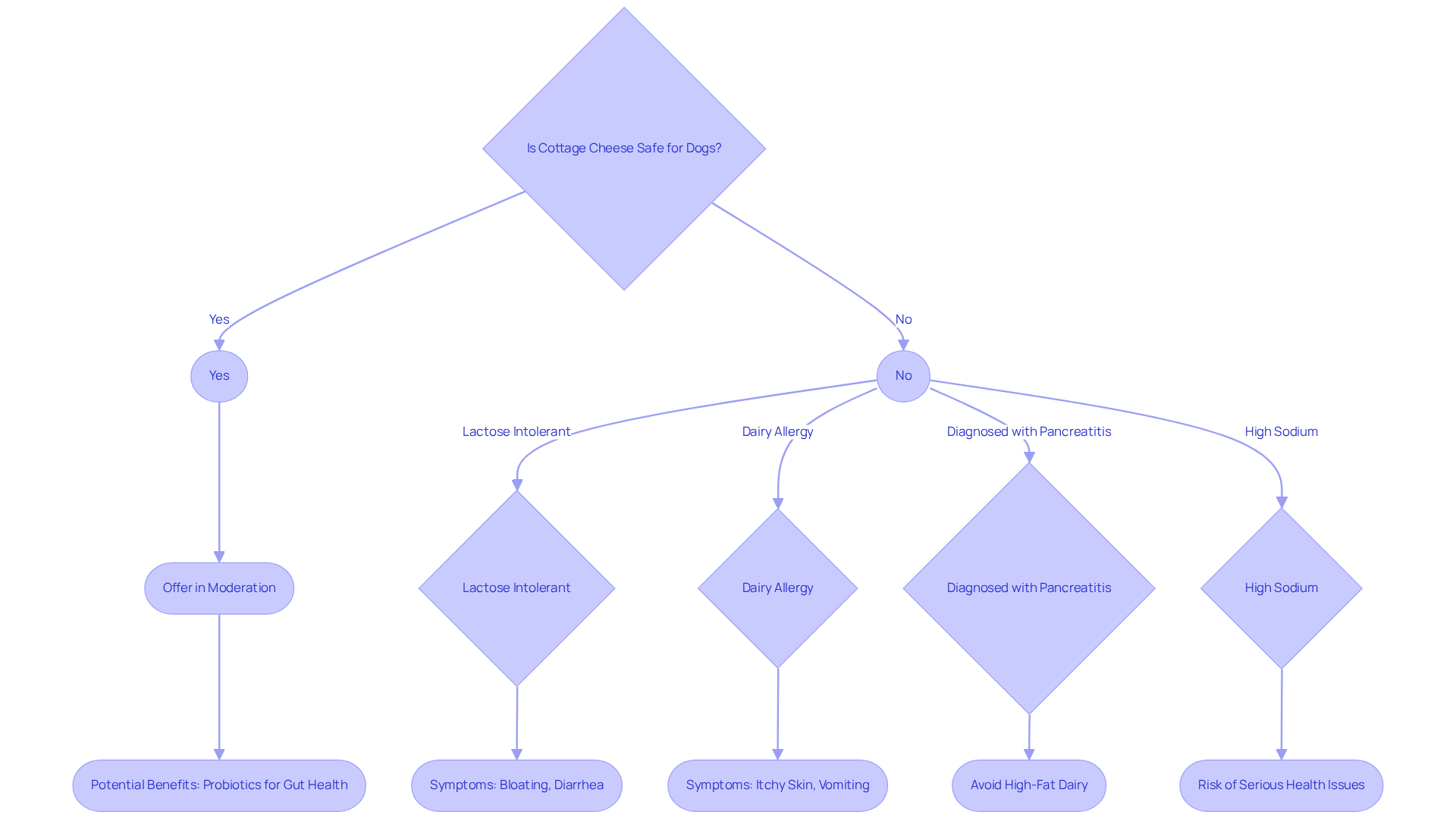
Conclusion
Cottage cheese can indeed be a safe and nutritious treat for your furry family members when introduced thoughtfully and in moderation. This dairy product offers numerous health benefits, serving as a rich source of protein, calcium, and essential vitamins that contribute to your pet’s overall wellness. However, it’s important to recognize that not all dogs can tolerate dairy, so careful monitoring is necessary to ensure it doesn’t cause any digestive discomfort.
Key insights remind us of the importance of moderation, with cottage cheese comprising no more than 10% of your dog’s daily caloric intake. The potential benefits include:
- Improved gut health from probiotics
- Support for muscle development
These make it an appealing addition to your dog’s diet. Nevertheless, we always recommend consulting with a veterinarian before introducing new foods, especially for dogs with known allergies or health conditions.
Ultimately, the decision to include cottage cheese in your dog’s diet should be made with careful consideration of their individual health needs. By staying informed and attentive to your pet’s reactions, cottage cheese can be a delightful and beneficial snack that enhances their nutrition and enjoyment. Embracing a balanced approach to your dog’s diet will ensure they thrive, leading to a happier and healthier life together.
Frequently Asked Questions
Is cottage cheese safe for dogs?
Cottage cheese can be safe for dogs when offered in moderation, as many dogs can digest it better due to its lower lactose content.
Can all dogs eat cottage cheese without issues?
No, some dogs may experience digestive discomfort due to lactose intolerance, which can cause gas, bloating, or diarrhea.
How should I introduce cottage cheese to my dog’s diet?
It is recommended to gradually introduce cottage cheese by starting with small portions and closely monitoring your dog for any adverse reactions.
What type of cottage cheese is suitable for dogs?
The cottage cheese given to dogs should be plain and free from harmful additives such as salt or flavorings.
What are the risks of feeding cottage cheese to dogs?
High sodium levels in cottage cheese can lead to elevated blood pressure, and excessive consumption may result in health issues like weight gain and pancreatitis, especially in dogs with pre-existing conditions.
How much cottage cheese can I give my dog?
Cottage cheese should comprise no more than 10% of your dog’s daily caloric intake to ensure it remains a healthy treat.
Should I consult a veterinarian before giving my dog cottage cheese?
Yes, it is essential to consult a veterinarian before introducing new human foods, including cottage cheese, into your dog’s diet to ensure their safety.


